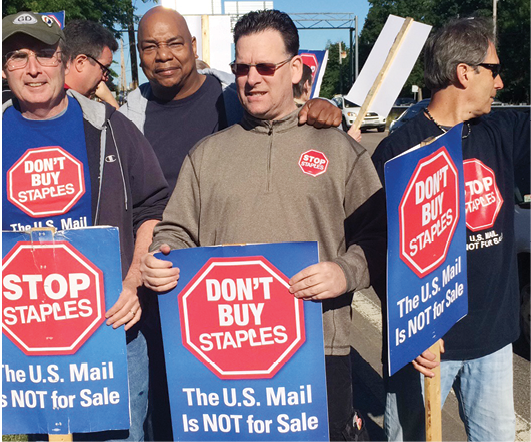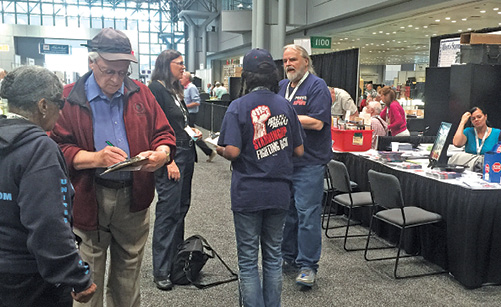Staples’ Headaches Mount; Protests Alive and Kicking!
July 8, 2016

(This article first appeared in the July-August issue of The American Postal Worker Magazine)
Merger? Rejected!
CEO? Out!
Stocks? Down!
Stores? Closing!
Stop Staples Movement? GOING STRONG!
Approximately 50 protesters greeted Staples shareholders outside the company’s annual meeting in Natick, MA, on June 14, waving banners and chanting, “The U.S. mail is not for sale!”
The meeting was Staples’ first after the Federal Trade Commission rejected its proposed merger with rival Office Depot. Ron Sargent, the company’s long-time CEO, had announced he would step down after the business strategy he championed was disapproved.
“The company was weakened by the FTC’s decision to deny the merger and it ended Sargent’s tenure,” APWU President Mark Dimondstein said. Sargent was replaced, at least temporarily, by Shira Goodman, the retailer’s president of North American operations.
Members of the Greater Boston Labor Council, National Association of Letter Carriers, National Postal Mail Handlers Union, Carpenters Union, Teamsters Union and Jobs with Justice, joined APWU members from the Boston Metro Area Local, South Shore (MA) Area Local, New York Metro Area Postal Union and Manchester (NH) Area Local at the event.
The merger would have increased prices and limited choices for individual customers and small businesses, Dimondstein pointed out, and the union played an important role in support of consumers by publicly opposing the merger when it was being considered by the Federal Trade Commission.
“The Staples brand was also severely diminished by the company’s dirty deal with the Postal Service – a major move toward privatizing a great national treasure,” he added.
“Staples’ stock is down, revenue is declining, and stores are closing,” Dimondstein noted. The number of stores is down to 1,900 worldwide, from a peak of 2,300, the Boston Globe reported, and the company’s stock has plunged to less than $9 a share, down from a peak of $28 in 2006.
Sargent’s departure as CEO presents a fresh opportunity for the office-supply company to “do the right thing and get out of the postal business,” he said.
Online Organizing
In addition to protesting outside Staples stores, enthusiastic activists in several cities are building the Don’t Buy Staples movement online.
Activists in multiple locations are keeping fellow union members and friends informed about the campaign through independent Stop Staples groups they created on Facebook. The groups include “Local 100 Stop Staples” (Boston), “Bay Area Stop Staples” (San Francisco Bay Area), “Stop Staples! Pittsburgh Metro,” “Stop Staples Philadelphia” and “Stop Staples NYC.” If you’re on Facebook, check them out!
Spreading the Word at the World Stamp Show

The APWU’s Stop Staples campaign and A Grand Alliance to Save Our Public Postal Service (see p. 28) took our message to the World Stamp Show in New York City May 28-June 4. Retirees from the New York Metro Area Local staffed an exhibit table, passing out Stop Staples postcards and other material.
Tens of thousands of collectors from around the world attended, perusing the stamps on display.
Many who stopped by were well-informed about postal issues and were eager to talk about the congressionally-manufactured financial crisis and mail delays caused by the closure of processing plants, reported Dennis O’Neil, a retired postal worker who helped staff the table.
A flyer about postal banking generated a lot of interest. “An older collector said he started a postal savings account in 1934 at the post office in Ottumwa, IA, with $1.50 he got for his 7th birthday,” O’Neil recalled. “I hope I’m still here when they bring it back,” the collector told O’Neil. “I’ll start a new account on Day 1.”
Ruling Will Lift the Veil of Secrecy, Union Wins Major Victory at NLRB
In a major ruling in favor of the APWU issued on June 15, the National Labor Relations Board (NLRB) ordered the Postal Service to immediately provide the APWU uncensored copies of documents about the pilot program that established postal counters inside Staples stores – information the APWU first requested in November 2013.
Noting that the Postal Service has a “rich history of responding to information requests with denials and delay,” the Board said that it would “not condone the [Postal Service’s] unlawful conduct by allowing it to delay any longer in producing the information.”
The Postal Service was ordered to turn over information regarding its relationship with Staples, including copies of agreements and correspondence between the USPS and the office-supply company; records of any special deals and payments between them, and training material the Postal Service provided to Staples about how to perform the work.
Perhaps most importantly, the Board ordered the Postal Service to release records of its internal deliberations regarding the decision to subcontract APWU work to Staples.
Lifting the Veil of Secrecy
“This ruling will go a long way toward lifting the veil of secrecy that has shrouded the Postal Service’s deal with Staples,” said APWU President Mark Dimondstein. Although the Postal Service released thousands of pages of documents in response to earlier APWU requests and NLRB rulings, it withheld information it claimed was “proprietary.”
“Postal workers – and the people of the country – have a right to know about management’s attempts to privatize the Postal Service,” Dimondstein said. “This NLRB decision will advance that goal.”
The ruling affirmed and expanded on a 2014 decision by NLRB Administrative Judge Eric M. Fine, who found that the Postal Service violated the National Labor Relations Act when it refused to provide information to the APWU. Fine ordered the Postal Service to turn over most of the documents but he accepted management’s claim that some information was “proprietary” and permitted the USPS to obscure such information and/or restrict the union’s right to disclose it.
The APWU appealed the portion of the ruling that allowed the Postal Service to redact or restrict disclosure of the information. In the June 15 ruling, the Board ordered “immediate and unredacted production of all documents requested, without any confidentiality agreement.”
The decision could have a significant impact on a separate case before the Board regarding the Postal Service’s refusal to bargain with the union over the subcontracting of postal work to Staples.
The APWU called on Postmaster General Megan Brennan to comply with the Board’s ruling rather than engaging in delaying tactics by appealing the decision to the courts.



